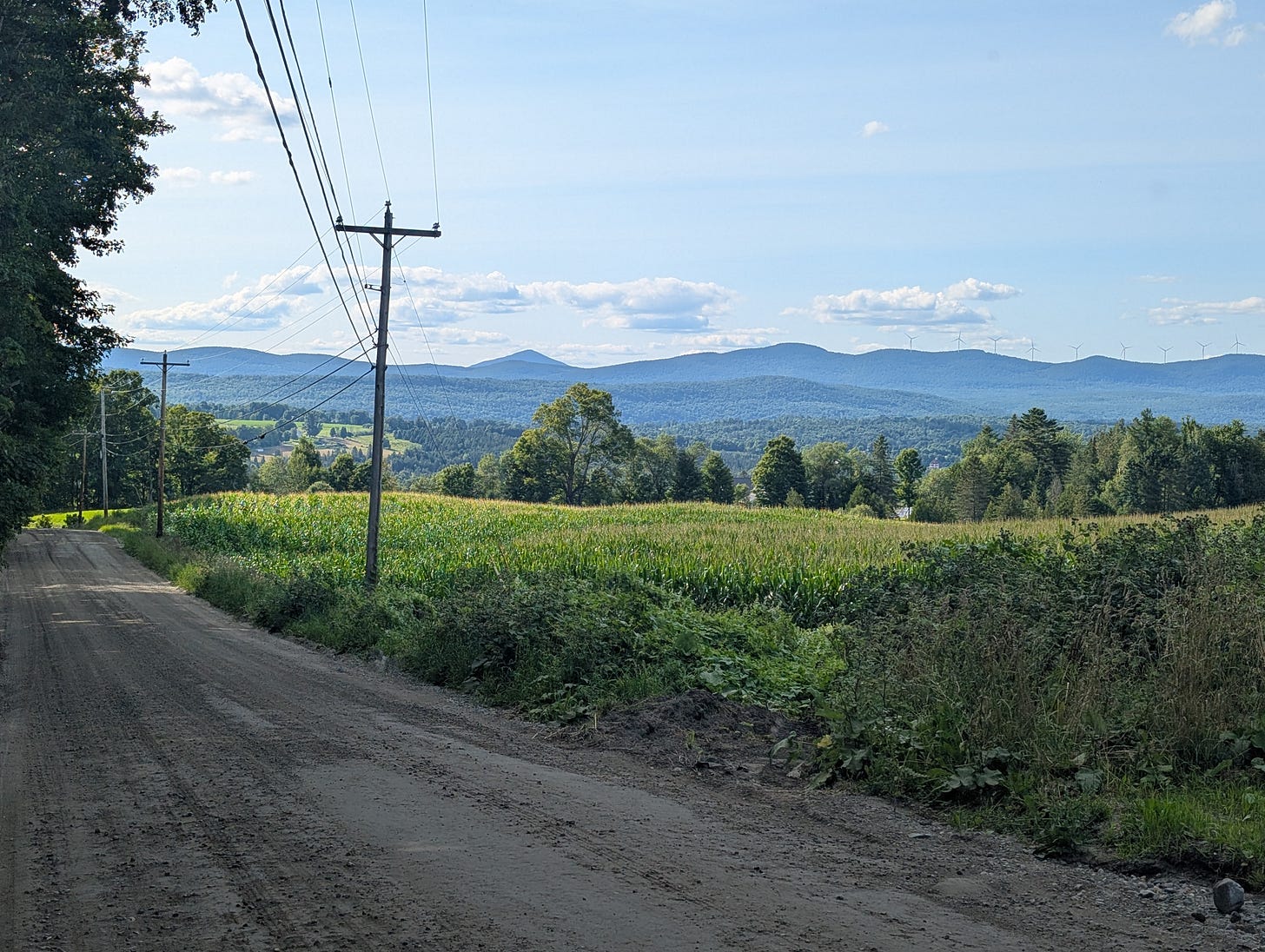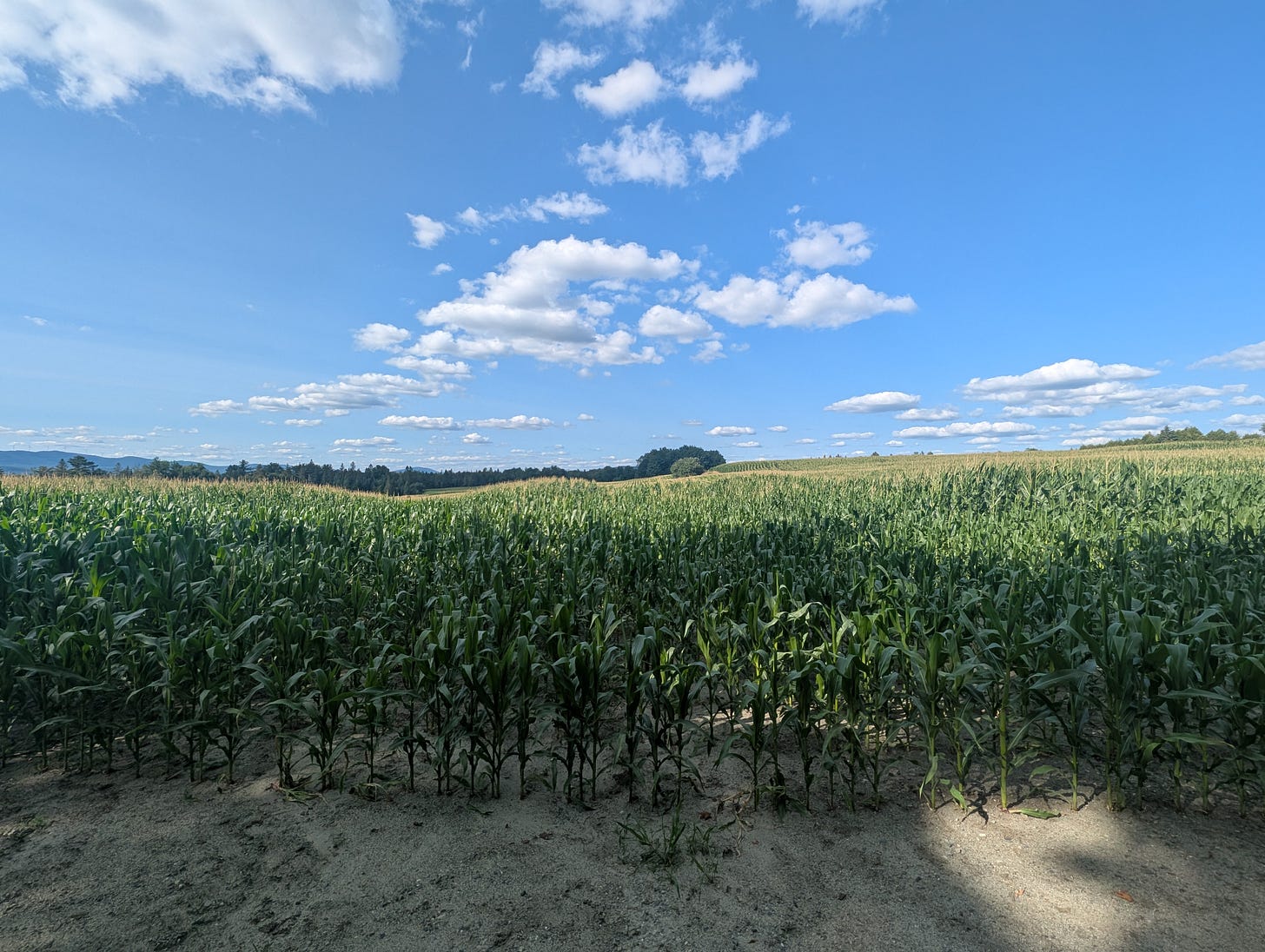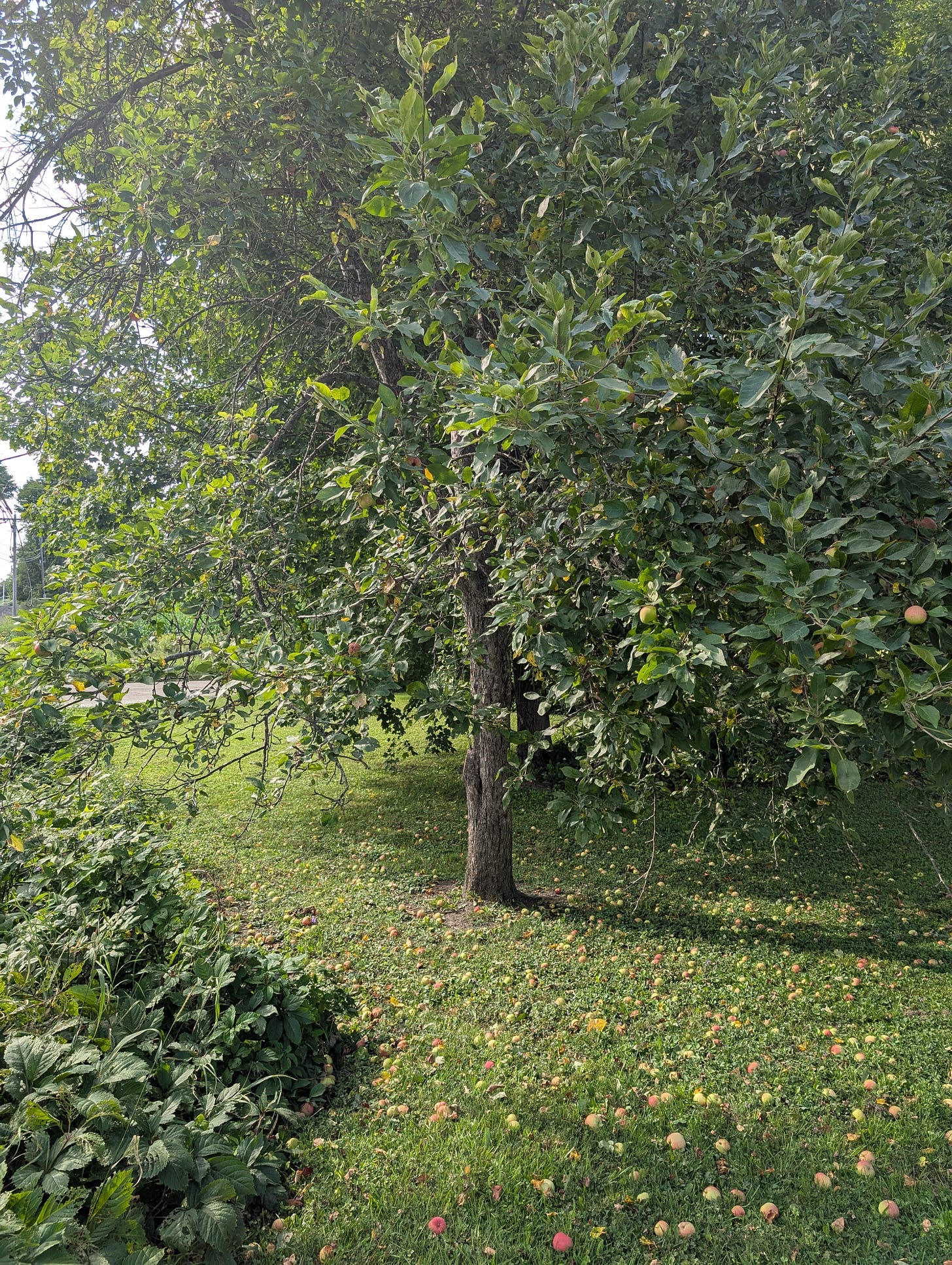Majoring in The Majors
Ecclesiastes, the rich man, and Paul's friends
I applied my mind to seek and to search out by wisdom all that is done under heaven; it is an unhappy business that God has given to humans to be busy with. I saw all the deeds that are done under the sun, and see, all is vanity and a chasing after wind.
Ecclesiastes 1:13-14
So if you have been raised with Christ, seek the things that are above, where Christ is, seated at the right hand of God. Set your minds on the things that are above, not on the things that are on earth, for you have died, and your life is hidden with Christ in God.
Col 3:1-3
Then he told them a parable: “The land of a rich man produced abundantly. And he thought to himself, ‘What should I do, for I have no place to store my crops?’ Then he said, ‘I will do this: I will pull down my barns and build larger ones, and there I will store all my grain and my goods. And I will say to my soul, Soul, you have ample goods laid up for many years; relax, eat, drink, be merry.’ But God said to him, ‘You fool! This very night your life is being demanded of you. And the things you have prepared, whose will they be?’ So it is with those who store up treasures for themselves but are not rich toward God.”
Luke 12:16-21
My grandfather ran a small landscaping business in Jacksonville, Florida, for many decades. By all accounts, he was good at it, but it didn’t completely consume his life; he was also an active elder in his church, loved fishing on the St. Johns River, and was a great family man. But looking back, he had some interesting personality traits. His home office in the backyard was, in family lore, famously cluttered and full of stuff. A mid-20th-century teal building with a carport sitting next to a jungle of tall plants, there were papers upon papers stacked in every inch, dirt and dust everywhere, and an old, old Buick that he never wanted to get rid of, which ended up having even more wildlife spontaneously grow in the backseat. He never liked getting rid of anything. When he died and my family took on the task of cleaning up that office, we found toll booth receipts from the 1960s, you know, just in case he needed them.
He was a wonderful man, loved God and loved neighbor, and while the business was successful, he wasn’t particularly rich. But I wonder if there had been just a couple of tweaks to the universe, and had he not also been “rich toward God,” as Christ says in our parable of the rich man (Luke 12:21), things could have gotten ugly. We’d still be cleaning up his office.
Jesus’ parable of the rich man (Luke 12:13-21) is certainly about material wealth. It’s also not only about that. Like those toll receipts, there are many ways to hoard things for ourselves. Most of us aren’t super rich, but maybe we have our own barns full of ideas we treasure, like knowledge about our favorite bands or sports teams or movies; we could master any bar quiz night with all our aptly-named “trivial pursuits.”
But maybe you’re above such silliness. You don’t waste time hoarding knowledge on pop culture. Instead, you have a very important, very serious barn full of ideas. You’ve gathered up every political opinion so that you’re certain you can debunk any false belief on the Current Thing. You read the great works of English literature like your salvation depends on it.
Or maybe you’re above that too. “I don’t care about politics, that’s all an empty game. I read theology.” Oh boy. From a religious studies major who went to grad school to be a preacher, you’ve really done it now.
Or maybe you’re a perfectly well-adjusted person and you have the privilege to be like the Pharisee in another parable, and confidently praying: “‘God, I thank you that I am not like other people’” (Luke 18:11). Beware, then, that your hard-earned confidence does not turn into a barn full of pride.
I’m in all of these pictures. It is sometimes exhausting to know so. The past two years, the peacefulness of Vermont has been a balm in helping me spiritually heal. But I also must recognize that if I’m not careful, I could even store up my treasure in peacefulness, serenity, relaxation, rest, or healing. Some days I just want to stay outside forever. But eventually, paycheck problem notwithstanding, even that would become unfulfilling.
With all of all of it, I can do any of these things with my mind neither on God nor things above, but solely on myself. And that’s missing it.
When thinking about what Jesus is saying, what the author of Ecclesiastes was discovering, and what Paul was trying to tell his friends in Colossae in setting their minds on “the things above” (Col 3:2), I think of that old phrase, to make sure you’re “majoring in the majors.” It’s old advice about priorities that says you want to major in the majors, not major in the minors.
There are all kinds of minors in the Christian life: our material wealth, our wealth of knowledge, even our riches of things like tranquility, and none of it is bad in and of itself. But they are minors at best, and when they are only for ourselves, they are rubbish.
Majoring in the majors in the Christian life is faith, hope, and love, based on the knowledge of who Jesus Christ is, that he loves you, that he loves all of us, that he died for you and us all, that we need a savior and, thank God, that we have one. And the life that we have been given here and now should have the fingerprints of this knowledge everywhere, embracing and rejoicing that Christ is all in all of it (Col 1:15-20).
Easy enough, right? Unfortunately not. Because of our sin, it is perhaps always easier to “major in the minors” in life, which is building up one treasure or another in order to enlarge and protect our sense of selfhood. That’s what our rich man does, after all. He sounds like the bird in our backyard who sounds like he’s chirping just to hear his own voice: “And he thought to himself, ‘What should I do? I have more than I need.’ Then he said, ‘I know, I’ll do this, build larger barns, and then I will say to myself, ‘Good job, me, now you can enjoy life.’” (Luke 12:16-19). It is not only the what of his materialism, though that is a problem. It is also that it is all swirling around the concerns of one person.
Majoring in the minors in pursuit of the self is the same disease that the author of Ecclesiastes, who tradition says is Solomon, also suffers. But to our benefit, the author of Ecclesiastes suffers this with openness and much more self-awareness than our parabolic rich man. 1
Ecclesiastes is a favorite book of the Bible for so many people, including on the edges of the Church. For many people who can’t trust whether the events of the Bible happened or not, they read Ecclesiastes and say, “Oh, that is real.” It’s the soul-searching of a man who has been there, done that, and found it all wanting. A man who has stored up a barn full of knowledge, wisdom, of even spiritual seeking, but something is still missing. The wicked prosper, the innocent suffer, and living for pleasure ultimately is for naught. But knowing this and pursuing all these things is, ultimately to Ecclesiastes, majoring in the minors. By the end of the book, the only thing that makes sense is to love God in awe-some fear and to live a life he teaches, putting our hope in the God who is above.
But how exactly do we do that? If we are not storing up treasures for ourselves, what ought we do and not do?
The Early Church could not easily come to a shared conclusion, and we have not done much better. I there is one common thing, it is the life absolutely brimming with faith, hope, and love. At the start of his letter, we learn that Paul has never met the Colossians, but he knows them just through their reputation for these things (Col 1:4-8). He knows and feels their transformed life through his friends, knowing that they have a hope that bears fruit. They are majoring in the majors.
But they weren’t perfect. While their hope was bearing fruit, it still needed to be refined by the knowledge of God, discernment, and spiritual wisdom. You can have a faith filled with hope and love for God, yet still be figuring out right from wrong. For the Colossians, like many other churches then, the tension they felt (broadly) was whether they needed to be more hardcore Torah followers or if they should “chill out” and be more open to a polytheistic society where anything goes. Discernment was somewhere in between. Ever since, Christians have wanted to make following Jesus harder than it is or easier than Christ says it must be.
Without Christ, they could not have managed this and would have eventually fallen into one camp or another. But because they have majored in the majors, they have a chance to fully discover and live a transformed Christ-following life among all the minors. By setting and resetting our minds on the Christ who is above, Lord of all, in it all, through it all, we are not ignoring any parts of “the all,” but we are better able to see them for what they are, and better able to see ourselves for who we really are to God: the new self, not the old self. Then all our favorite minors are fulfilled by the majors.
In the new self, all your barns full of stuff, or your knowledge, or your sense of justice, or your moral clarity, or your inner peace, can be used not for you, but for others, redeemed by Christ to their truest ends. You can find Christ in your political activism. You can find Christ in sports and the wonderful world of trivial music knowledge (ask any Phish fan). You can find Christ in the amazing way nature works and the amazing way people work. Pride and self-involvement can ruin any of it, but through Christ, faith, hope, and love can transform all of it.
What Paul is so often saying in his moral teachings, then, is that once you're here in Christ, you are home. So beware when people with false teachings lead you away from home and this transforming life. And beware things like “sexual immorality, impurity, passion, evil desire, and greed (which is idolatry),” (Col 3:5), or “anger, wrath, malice, slander, and abusive language,” (Col 3:8), anything that makes you forget where your true home is. To do the things that take us away from our true home in our new self is like if Solomon wrote Ecclesiastes and then went and built another palace. It wouldn’t even make sense, not to Ecclesiastes, and not to Paul. I Christ, you are here, and you are home.
So the invitation today is to major in the majors, knowing that if it can be described as a college major, it’s a minor in the Christian life while still redeemable within it. As a final example, I have a “Master of Divinity” degree, which is hilariously and terribly named. None of us can master Divinity; the Divinity we know as Christ is the master of it all. We don’t master him, he masters us. But you can major in his majors.
You can never have too much of the faith of Christ. You can never have too much of the hope of Christ. You can never have too much of the love of Christ. And you can never fit them in a barn.
H/t At Home with the Lectionary podcast






